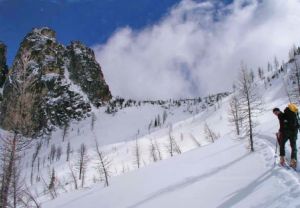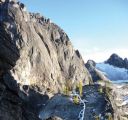Southwest Couloir, South Early Winters Spire II 5.0 40º |
||
Washington Pass, Washington, USA | ||
| ||
|
Avg time to climb route: 1-2 hours
Approach time: 1.5-3 hours Descent time: 1.5-3 hours Number of pitches: 10 Height of route: 600' Overview
The Southwest Couloir on South Early Winters Spire is one of the most moderate climbs in this book and is the easiest route in the Liberty Bell group. It is best done when there is snow all the way up the couloir and the chockstone near the bottom is completely covered. The Southwest Couloir has an excellent alpine ambiance. It feels like many bigger climbs in the range and is a great place for aspiring climbers to learn techniques and gain confidence.Photos
- View all 1 photos of Southwest Couloir as: Thumbnails | Slideshow
Climber Beta on Southwest Couloir
Find other routes like
Southwest Couloir
Route History
First climbed by Kennethn Adam, Raffi Bedayn, and W. Kenneth Davis in July, 1937. When this trio first hiked in the 16 miles, all the summits were still virgin. This group was part of the California Sierra Club and had considerable experience, including several longer climbs in Yosemite. Due to the loosely spaced lettering of the words “Liberty Bell” on their Forest Service map, the climbers didn’t know exactly which of the spires was Liberty Bell and thus picked the tallest, southern-most peak in the range. This decision was also made partially because all the other spires looked extremely difficult on all sides, so they opted to climb the non-technical Southwest Couloir. Their coveted first ascents upset a few locals who had been hoping to make the first ascent themselves; quickly pointing out that their “Yosemite training” had only got them up the only non-technical route in the Liberty Bell group. Adam, Davis, and Bedayn did also manage to make the first ascent of Cutthroat Peak via its technical and intimidating peak via its West Ridge on this same trip, a route that was rarely repeated until the highway was built. Strategy
The Southwest Couloir on South Early Winters Spire is one of the most moderate in this book and the easiest route in the Liberty Bell group. Conditions are ideal when snow is covering the entire couloir, including the chockstone near the bottom. The snow should be firm or you will post-hole up to your hips all the way up the route. Crampons are generally required, but it is unusual that snow conditions are bullet hard because the route gets so much afternoon sun.The steepest sections are all on the lower half, while the upper half is a fair bit mellower. Once at the top of the couloir, when you gain the ridge, there is a short 4th class (maybe 5.0) section leading to the final summit boulder. A spot for the final summit boulder problem might be better than a belay. While some climbers don’t even bring a rope for this route, don’t be afraid to bring one yourself, you might even help someone else out. If you are planning to belay sections of this route, a couple pickets and a small selection of rock pro are far better than ice screws. Since this is the easiest route in the Liberty Bell group, you might expect it to be more popular. However, because of its short season – only two to four weeks after the highway opens and one to two weeks before it closes – it sees less traffic than you would think. As a result, you’ll likely have the route to yourself mid-week and share it with maybe one to three other parties on a busy weekend. For those up to the challenge, the Southwest Couloir makes an excellent steep ski descent. Wait for softer conditions; the afternoon is usually the best. Retreat Storm
The ascent route is typically the descent route. If you need to retreat, descend the climbing route at any time by down climbing or rappelling. You can sometimes find fixed anchors in the sides of the rock walls. This is a good option if conditions are firm. You do not want to attempt this route if avalanche danger is high or the temperatures are warm.
Everything You Need to Know About
Washington Pass
Search the internet for beta on
Southwest Couloir
|
Other Routes on South Early Winters Spire
|





